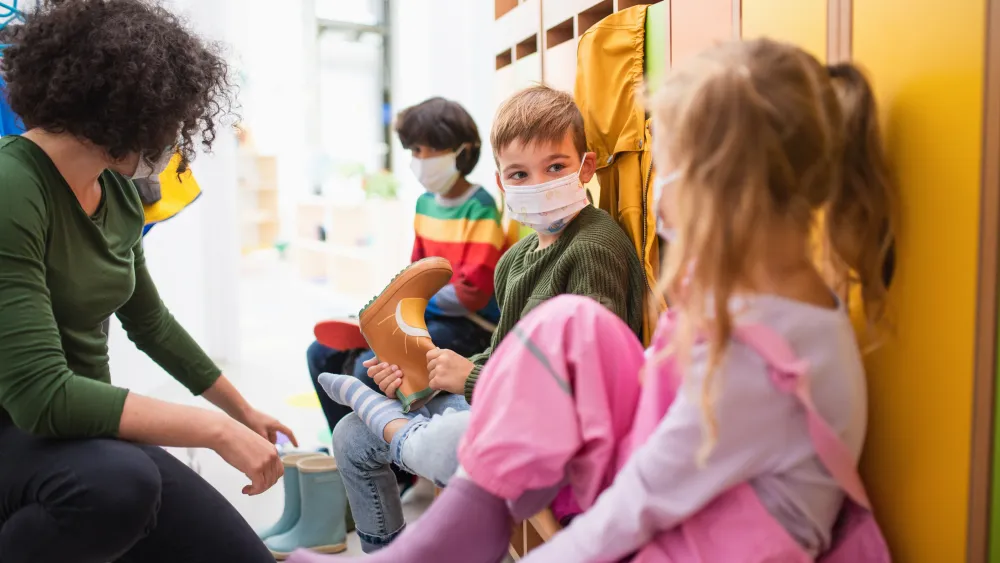Family Health
Omicron and Kids: More Than Just a Mild Concern
Published: Jan. 11, 2022

It’s no secret that the COVID-19 Omicron variant has made its way into our community. Early research – and perhaps personal experience – indicate that it’s more contagious than previous variants, leading to a record number of COVID cases and more breakthrough infections than we’ve seen all pandemic. And while research also suggests that the variant is milder, that may not be true for all young people.
Back to the Basics With Alarming Statistics
In recent weeks, pediatric COVID-19 cases have increased 78%. And U.S. hospitals are now reporting record numbers of COVID-positive children – especially among those younger than 5, who aren’t yet eligible for vaccination.
While many of these hospitalizations have been incidental – meaning the cases were caught in children admitted for other health issues – the numbers still illustrate what I and many of my pediatric colleagues have long been preaching: Vaccination – and other tried and true precautions like masking and social distancing – matter. And maybe now more than ever.
At Methodist Physicians Clinic, the majority of phone calls we’re fielding right now are from concerned parents – parents who think their child might have COVID-19 and parents who are stressed about next steps. Our clinic’s testing positivity rate is averaging 50% or more on most days. And nationally, COVID-19 is now one of the top 10 causes of death in children. What makes this all so difficult to accept is that COVID-19 is often preventable, and it doesn’t have to spread so quickly. By now, most parents likely know this, but let’s go over the basics:
Vaccination
In December, Pfizer-BioNTech announced that three doses (two original doses and one booster) of its COVID-19 vaccine are enough to neutralize the Omicron variant, which is great news for 12- to 17-year-olds who are now eligible for a Pfizer-BioNTech booster.
But this shouldn’t worry parents of fully vaccinated children who aren’t yet eligible for a boost. Fully vaccinated children in the 5-11 age group don’t yet have waning immunity, as the vaccine just became available to them in November. Their immunity levels are still good, and they’ll likely have no serious issues over the next several weeks – especially if those around them are vaccinated and boosted.
The same goes for children younger than 5 who aren’t yet eligible for vaccination. It’s critical that those living with them and caring for them are fully vaccinated and boosted.
Although Pfizer-BioNTech is working on an Omicron-specific vaccine, I’m a firm believer that if everyone eligible for vaccination took advantage of the science, this variant could easily be controlled, and our kids would be in a much safer situation right now.
Masking
Masking – whether your child is vaccinated or not – will always provide another layer of COVID-19 protection, especially if it’s done appropriately (covering the nose and mouth). And as the Omicron variant surges, I encourage all parents to upgrade their child’s cloth face masks to surgical or KN95 masks. Research suggests these masks can be nearly as efficient as N95s when worn correctly.
Social Distancing
Social distancing can be difficult and confusing for kids – especially if they’ve been given a taste of reuniting with vaccinated friends and family over the holidays. Many of them may be thinking that the rule no longer applies to them. It does – even if they’re vaccinated.
My hope is that most schools are already implementing 6-foot distancing between students and that parents have talked with their children about the importance of maintaining space when eating, playing and interacting with peers. It’s worth a refresher if you haven’t talked about it with your child recently.
And here’s the thing: Just because kids are in school doesn’t mean it’s a good idea to venture to all public places. School is the priority right now. The goal is to keep them there. So I encourage parents to limit hauling their kids to the grocery store or any other public indoor place. Avoid unnecessary exposure by using your best judgement and weighing the risk. If the trip doesn’t benefit your child’s health and well-being, consider keeping them home – at least until community spread settles down.
What To Look For
While the Omicron variant can cause serious illness in unvaccinated children, it typically causes milder symptoms among fully vaccinated children.
When it comes to mild Omicron symptoms, parents should watch for the five most common:
- Fever
- Fatigue
- Runny nose/congestion
- Sore or scratchy throat
- Dry cough
Mild Omicron cases look almost identical to the common cold. Keep your child home if they’re showing any cold-like symptoms, and get them tested so you can rule out COVID-19. In more serious Omicron cases, children may be hospitalized for croup-like symptoms, bronchiolitis and dehydration.
If you think your child may have COVID-19, call their health care provider to determine if they need to be seen or tested. Go to the emergency department if your child:
- Is struggling to breathe (Look for chest retractions or flaring nostrils.)
- Is confused, dizzy or extremely sleepy
- Has chest pain
Stay the Course With Peace of Mind
It’s true that the sheer volume of COVID-19 cases has led to more pediatric hospitalizations, but it’s important to remember that only a small percentage of kids who contract Omicron will need to be hospitalized.
You can help keep your family safe by consulting a trusted health professional and going back to the basics when it comes to COVID-19 protection. Reconsider your stance against vaccination if you have yet to vaccinate yourself and/or your children. And don’t let up on the efforts you’ve made thus far. I’m confident that families who stay the course can avoid COVID-19.
More Resources
- Read more about the importance of vaccinating 5- to 11-year-olds.
- Learn more about the common wintertime illness RSV and how it’s treated.
- Find a pediatrician.
- Read the latest information on COVID-19.


